Nelson Mandela & Nguyễn Chí Thiện's Ai Điếu
Note: Thú thực, Gấu đang chờ bài ai điếu này của tờ Người Kinh Tế. Tờ báo thần sầu, ở “ai điếu”, ở “điểm sách”.
Bài về Solzhenitsyn mũi tẹt, Bắc Kít, mà chẳng tuyệt cú mèo ư?
Mít, không tên nào viết nổi.
Modesty, humility, vanity
“There are
times when a leader must move ahead of his flock.”
Mr Mandela
did not single-handedly end apartheid. The collapse of communism, yoked
to
African nationalism by white opponents, played a part; so did
international
sanctions, domestic economic pressures, non-ANC internal resistance and
the
person of F.W. de Klerk, president from 1989 to 1994, whom Mr Mandela
did not
treat altogether well. But Mr Mandela’s symbolic role was hard to
exaggerate.
His greater
achievement was to see the need for reconciliation, to forswear
retribution and
then to act as midwife to a new, democratic South Africa, built on the
rule of
law. This was something only he could do. He gave hope to millions of
Africans
and inspired millions of others elsewhere, but if his successors in
government
have been less admirable, and if his example has not been followed in
countries
like Zimbabwe, that should not be surprising. Heroic though he was, he
did not
have the messianic powers some attributed to him, nor could others be
expected
to match his capacity to hold high principles, to live by them and to
use his
moral stature to such effect. Circumstances, after all, could hardly
suit
everyone so well. Hard though much of his life had been, Mr Mandela
lived long
enough to see his work through. That gave him his great achievement,
and his
story a happy ending. And the modern world loves a happy hero even more
than a
tragic one.
Nguyễn
Chí Thiện
Cả ngàn con sóng
Những con sóng bạc đầu
Những lần ra đồng lao động
với bạn tù, nhiều người trong họ cũng là thi sĩ, ông đọc
những bài
thơ của ông cho họ nghe, và họ đáp lại bằng thơ của họ. Một
số trong họ đếm nhịp thơ bằng ngón tay để
nhớ. Ông không bao giờ làm vậy. Chỉ hồi nhớ là đủ. Hồi nhớ không chỉ
phục vụ thơ,
mà còn cứu ông. Sau 1979, ông trải qua phần đẹp nhất của tám năm trời
trong cô đơn,
trong nhà kho, trong gông cùm, trong bóng tối. Thơ của ông trở thành
những tiếng
sụt sùi, những tiếng khò khè, những trận ho lao thổ máu. Nhưng trong
đầu, ông
vẫn làm những chuyến đi câu, hay ngắm bình minh làm nhạt nhòa những
vì sao. Ông
ngửi mùi hoa nhài, hơi phở nóng trên phố đêm Hà Nội. Ông nhớ bà chị
Hảo của
ông và những lần bà dạy ông tiếng Pháp, khi ông mới sáu tuổi – ôi chao,
đúng là
thiên đàng, cái thời kỳ thuộc địa Tây, khi nhìn lại – và ông nhập vào
với Đạc Ta Nhan và đồng bọn. Bằng cách đó,
nó giữ ông
sống.
Uống rượu với
Lý Bạch
Bạn tù ưng ý
nhất của ông, là Lý Bạch, nhà thơ lớn TQ, thế kỷ 18. Ông nhắm rượu
với Lý Bạch
từ những ly hổ phách, uể oải toài người trên những chiếc ghế dài,
ngắm mấy
em hầu rượu trong những chiếc xường xám lụa Tô Châu, dưới hàng dương
liễu, “nhìn
những mùa thu đi”, cùng những cánh đào rơi rụng. Ông sẽ lèm bèm với Lý
Bạch bằng
cái giọng say say, rổn rảng, và, "vãi linh hồn" biết mấy! Ẩn chìm trong
nỗi vui cùng
cụng ly với bợm nhậu, thánh thi Tẫu, là cái tuổi trẻ của ông, những năm
tháng lê
la nơi... Khâm Thiên, ăn ngủ hút sách cùng đám cô đầu, y chang Nguyễn
Tuân hồi
trước Cách Mạng! Cả hai, ông, và Lý Bạch đều chọc quê hoàng đế, cha già
dân tộc,
đều phỉ nhổ vào cái hệ thống giáo dục, và đều bị trừng phạt. Hình như
là
cái quá khứ xa vời đó lại có
vẻ chịu đựng được. Nhưng đúng là chịu đếch nổi, những hành động của Quỉ
Đỏ VC,
với những chiếc loa nơi đầu phố oang
oang tối ngày sáng đêm về Hạnh Phúc và Ánh Sáng.
Ra khỏi tù,
như Lý Bạch, ông chơi quốc lủi một dạo, và cố kiếm sống bằng cách bán
những chiếc
nan hoa xế đạp. Chẳng đi đến đâu. Từ 1995, ông xoay sở để có được 1
chốn ra vô ở
Mẽo. Ông sống khiêm nhường ở Tiểu Sài Gòn, Quận Cam, California, cùng
vài đồng
hương, bạn bè. Trà và thuốc lá là hai món an ủi ông mỗi ngày. Một cái
mũ, như
trong hình, là thương hiệu của ông. Ông chẳng có gì để chia sẻ, ngoài
những bài
thơ, và những hồi ức về những bạn thi sĩ tù, mà những ngôi mộ của họ,
rải rác
đâu đó, làm thành những nét chấm phá, trên những mảnh đồi, chung quanh
trại tù,
trại lao động cải tạo. Chỉ có thế, và thêm vào đó, là lòng thù hận chế
độ VC ở
quê hương của ông, nơi bọn chúng cấm tiệt thơ của ông.
Nếu có người
có thể nhìn thấy trái tim của tôi, ông viết hồi năm 1960, trong lần đi
tù VC đầu
tiên, người đó sẽ nhìn thấy nó là một cây viết cũ, một giá viết, mờ bụi; hay một cái quán nghèo nàn bên đường, mà tiện
nghi độc nhất là ngọn đèn dầu. Nhưng nó cũng còn là một cánh
đồng lúa đợi những cơn mưa lũ tháng Tám,
Và như thế nó
có thể ứ trànCả ngàn con sóng
Những con sóng bạc đầu
Vĩ nhân cuối cùng
Tháng 12 12, 2013
J. M. Coetzee
Phạm Thị Hoài dịch
J. M. Coetzee
Phạm Thị Hoài dịch
Nelson
Mandela đã mất, sau một cuộc đời dài. Một cuộc đời dài, nhưng bị cắt
khốn khổ.
Hai mươi bảy năm sung sức nhất của đời mình, ông phải sống trong tù vì
sự độc
đoán của chính quyền. Nhưng ở trong lao ông không bất lực. Những năm
cuối án tù
dài dằng dặc ấy, thực tế ông đã sử dụng quyền phủ quyết về chính sách
ngoại
giao của đất nước và khiến cai tù ngày càng ngả theo ông. Cùng với F.W. de Klerk, một người kém vóc dáng đạo đức
hơn nhiều nhưng cũng đóng góp cho công cuộc giải phóng Nam Phi theo
cách của mình,
Mandela đã giữ vững một đất nước sục sôi biến động trong những năm nguy
nan
1990-1994 và dùng sức quyến rũ lớn của bản thân để vừa thuyết phục
những người
da trắng rằng họ cũng có chỗ trong nền cộng hòa dân chủ mới, vừa tước
quyền lực
của phe da trắng cánh hữu li khai.
Khi chính
mình trở thành tổng thống, ông đã già. Việc ông không thể quan tâm mạnh
mẽ hơn
đến vấn đề cấp thiết nhất của thời đại – thiết lập một thể chế kinh tế
công bằng
– là dễ hiểu, song cũng là bất hạnh. Ông cũng bị lóa mắt trước sự sụp
đổ của hệ
thống xã hội chủ nghĩa trên thế giới như toàn bộ giới lãnh đạo Đảng
ANC. Để chống
lại cái chủ nghĩa duy lí kinh tế cướp bóc, Đảng của ông không đủ khả
năng kháng
cự về tư tưởng.
Mandela bênh
vực đấu tranh vũ trang chống chế độ apartheid về nguyên tắc, và hứng
chịu sự trừng
phạt nặng nề cho thái độ ấy. Uy tín cá nhân và uy tín chính trị của ông
dựa
trên những điểm này. Những điểm tựa khác của ông là một phong thái quý
tộc đượm
chút dân dã mà lịch duyệt, và nếp giáo dục xưa, khiến ông tuân theo
những mẫu mực
nghiêm ngặt của thời Victorian về tư cách cá nhân và tinh thần phụng sự
lợi ích
chung. Với một sự rộng lượng vô bờ bến, ông đã thu xếp được cuộc chung
sống với
một người phụ nữ càng ngày càng tác quái. Ông là một vĩ nhân và cả thế
giới đều
thừa nhận điều đó khi ông qua đời. Rất có thể ông là vĩ nhân cuối cùng,
bởi ý
tưởng về độ lớn của tầm vóc tan vào bóng tối của lịch sử.
Nguồn: FAZ, 08-12-2013
Bản tiếng Việt © 2013 pro&contra
In the Sydney
Morning Herald, the South African-born 2003 Nobel laureate in
literature J.M. Coetzee writes:
Nelson Mandela has died after a long life –
long yet lamentably truncated in that he spent 27 of the best years of
his
manhood incarcerated at the pleasure of the state.
Incarcerated, he was hardly powerless.
During the final years of that long sentence he in effect exercised a
power of
veto over the foreign policy of his country, exerting more and more of
a
strangehold over his jailers.
With F.W. de Klerk, a man of much smaller
moral stature, yet also, in his way, a contributor to the liberation of
South
Africa, Mandela held a turbulent country together during the dangerous
years
1990-94, exercising his great personal charm to persuade whites that
they had a
place in the new democratic republic while step by step emasculating
the
separatist white right wing.
By the time he became president in his own
right, he was already an old man. His failure to throw himself more
energetically into the urgent business of the day – the creation of a
just
economic order – was understandable if unfortunate. Like the rest of
the
leadership of the ANC, he was blindsided by the collapse of socialism
world-wide; the party had no philosophical resistance to put up against
a new,
predatory economic rationalism.
Mandela's personal and political authority
had its basis in his principled defence of armed resistance to
apartheid and in
the harsh punishment he suffered for that resistance. It was given
further
backbone by his aristocratic mien, which was not without a gracious
common
touch, and his old-fashioned education, which held before him Victorian
ideals
of personal integrity and devotion to public service.
He managed relations with a wife, whose
behaviour became increasingly scandalous, with exemplary forbearance.
He was, and by the time of his death was
universally held to be, a great man; he may well be the last of the
great men,
as the concept of greatness retires into the historical shadows.
Note: Do không biết tiếng Đức, Gấu mò bản
tiếng Anh, thấy có tí khác. Thí dụ:
Bản tiếng Anh, trong sự khoái trá của nhà
nước, at the pleasure of the state.
Rất có thể ông là vĩ nhân cuối cùng, bởi ý
tưởng về độ lớn của tầm vóc tan vào bóng tối của lịch sử. PTH
Câu tiếng Anh, thú hơn, he may well be the
last of the great men, as the concept of greatness retires into the
historical
shadows: ông có thể là vị vĩ nhân sau cùng, của những vị vĩ nhân, khi
mà ý niệm
về sự lớn lao lui vô bóng tối lịch sử.
Câu này giải thích cái thái độ “ly khai”, bỏ
thẻ Đảng vô thùng rác… của mấy đấng Mafia Đỏ: Chỉ
1 khi về hưu [retire], thì mới dám làm vĩ nhân!
Natalia
Gorbanevskaya, a Russian poet and Soviet dissident, died on November
29th, aged
77 (1)
Lời vinh danh Nelson
Mandela, bảnh nhất, theo Gấu là của Kincaid,
khi viết về quê hương của Bà:
Bạn cứ tới những nơi chốn,
nơi cái xiềng thuộc địa thật sự
bằng thép, và tỏ ra hết sức hữu hiệu: Phi Châu, vùng Caribbean, hay một
nơi nào
khác trên địa cầu. Phi Châu là một thảm họa. Tôi không hiểu đất đai con
người ở
đây rồi có ngày lành mạnh trở lại, hay là không. Thật khó có chuyện,
những ông
chủ thuộc địa bỏ qua, không đụng tới cái phần tâm linh của con người
Phi Châu.
Bởi vậy, chuyện tiểu thuyết hóa là đồ dởm. Những người Phi Châu đối xử
với nhau
thật là độc ác; bạn chỉ việc nhìn tất cả những con người đói khát đó
thì thấy.
Làm sao có chuyện những ngài thủ lãnh Phi Châu nhìn vào mặt con dân của
họ, và
rớt nước mắt? Họ cứ tiếp tục duy trì, theo một con đường tệ mạt khốn
kiếp, cái
điều đã xẩy ra khi còn chế độ thuộc địa. Sự thực, là bất cứ đâu đâu, cái
gọi là
di sản của chủ nghĩa thuộc địa, đó là: độc ác, tàn nhẫn, trộm cướp.
Cách những
tên thực dân đối xử: mild way, nhẹ nhàng thôi, đôi lúc có xoa đầu những
người
dân cô lô nhần, bây giờ chúng ta đối xử với nhau, theo một cách cay độc
hơn,
khốn kiếp hơn. Và bạn biết không, chúng ta cứ mắm môi mắm lợi, lấy hết
sức lực
ra, full force, để mà "chơi" nhau. Bởi vậy, có thể dưới luật thuộc
địa, người Phi Châu ăn rất ít; dưới luật của người Phi Châu, họ chẳng
ăn gì hết - và cứ như thế. (1)
Có thể nói, độc
nhất, có một ông da màu Mandela, “vượt quá lời nguyền [rủa]” trên, đối
với toàn
nhân loại Da Màu!
Làm đếch có “không biên giới”, giữa Da Màu và Da Trắng, nếu suy từ câu của Kincaid.
Làm đếch có “không biên giới”, giữa Da Màu và Da Trắng, nếu suy từ câu của Kincaid.
~ Posted by
Samantha Weinberg, December 6th 2013
Windhoek,
Namibia, 1990: I was freelancing for the Natal Witness and Africa's
last colony
has just celebrated its independence in a soaring ceremony in the
city's main
stadium, watched by leaders from every corner of the globe. Castro was
there, I
remember, and Yasser Arafat, as well as the UN secretary-general,
Javier Pérez
de Cuéllar, and Dizzy Gillespie. But the eyes of most people present
were fixed
on a tall elegant man and his extravagantly hatted wife. Nelson
Mandela's years
of imprisonment had finished only a few weeks before. Here was the man
who had
been world-famous for decades, but for nearly all of us there, it was
the first
time we had seen him in the flesh.
A few hours
later, I was walking back over the hill towards my B&B when a white
car
drew up beside me. The window opened and a white man in mirrored shades
beckoned me over and asked for directions. I gave them as best as I
could and
when I finished, I heard a voice from the back seat thanking me. I
leaned in
and there was Mandela, smiling, sitting beside Winnie, who looked
distinctly
grumpy. He put his hand out to shake mine and I wished him the very
best. The
window was wound up and the car pulled away.
Johannesburg,
1991: I was working for the Weekly Mail and Mandela, now president of
the ANC,
had been invited to give a speech at the foreign correspondents'
dinner. After
coffee, his neighbour, Patti Waldmeir, the Financial Times
correspondent and
later author of "Anatomy of a Miracle" about the dismantling of
apartheid, beckoned me over and introduced me to Mandela. His warmth
was
immediate and when I mentioned that my father had been at the bar with
him over
four decades earlier, he said he remembered him well, and mentioned a
mutual
friend of theirs, Joel Joffe, who had represented Mandela in the
Rivonia trial.
It can only have been a three-minute conversation (I didn't feel I
could stay
longer) and after I shook his hand, I floated away.
Johannesburg,
1995: I went back to South Africa for American Vogue to write the copy
and act
as fixer and driver for a fashion shoot that Bruce Weber was doing with
Iman.
It was two years after Mandela had won the Nobel prize and the year
after he
became president. The trip was pretty stellar—Iman's husband David
Bowie came
along too—involving grand pianos, township boxing clubs, Miriam Makeba
and
Archbishop Desmond Tutu. But what everyone wanted was a shot of Iman
with
Mandela.
On our last
day, we heard that he would see us at his private house in Houghton. We
turned
up and were shown into the garden, where Mandela was sitting on a
chair,
wearing a patterned shirt. He greeted us all in turn, showing only a
little
more attention to Iman than to the lighting assistant. Then, as Bruce
was setting
up the shot and Iman changing into her frock, I was sent over to talk
to him. I
can't remember exactly what we talked about—I'm not sure I knew even
then—but I
remember the feelings that washed through me, a heady and unusual
combination
of euphoria and serenity. For the thousands of people who had a
glancing
encounter with Mandela, there was no mistaking that aura.
Samantha
Weinberg is our assistant editor. She is a former commissioning editor
on
Eureka and the author of "A Fish Caught in Time"Nelson Mandela
Nelson Mandela, the man who freed South Africa from apartheid, died on December 5th, aged 95
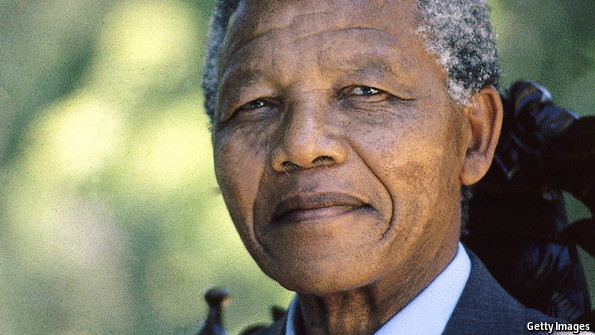
WHO was the greatest statesman of the 20th century? Discard the mass murderers such as Joseph Stalin and Mao Zedong; set aside the autocratic nationalists like Gamal Abdel Nasser and the more admirable, but probably less influential, anticommunists like Vaclav Havel; then winnow the list to half a dozen names. On it would perhaps be Mohandas Gandhi, Winston Churchill, Franklin Roosevelt, Charles de Gaulle, Jack Kennedy and Nelson Mandela. For many people, in many lands, the most inspirational of these would be the last.
Related
topics
Mr Mandela’s heroic status is a phenomenon. For years
his fame was largely confined to his own country, South Africa. He did
not become widely known abroad until his first trial, for high treason,
ended in 1961. Though acquitted, he remained free for little more than
a year before going to prison for 27 years and six months, convicted of
sabotage and promoting revolution. During this long confinement, more
than 17 years of which were spent on Robben Island, a wind-scorched
Alcatraz off the Cape coast, little was heard of Mr Mandela and nothing
was seen of him. When he emerged from captivity on February 11th 1990,
no contemporary photograph of him had been published since 1964; the
world had been able only to wonder what he looked like.He was by then 71 years old, and barely ten years of semiactive politics remained to him. Nonetheless, more than any other single being, he helped during that decade to secure a conciliatory and mostly peaceful end to apartheid, one of the great abominations of the age, and an infinitely more hopeful start to a democratic South Africa than even the most quixotic could have imagined 20 years earlier.
A pattern of paradox
That someone who had been in enforced obscurity for so
long could exercise such influence suggests a remarkable personality.
Personality alone does not, however, fully explain the extent and depth
of admiration for the man that had accumulated over the years and that
now found expression in outpourings of affection in country after
country, whether he was touring Africa, greeting 75,000 fans in a
London stadium or sweeping down Broadway in a motorcade festooned by
more ticker tape, it was said, than had ever fluttered onto a New York
street before.Mr Mandela was a celebrity, and this is an age that sets a high value on any kind of fame. When every pop star is “awesome”, reality television makes idols out of oafs and “iconic” is so freely applied that it has become meaningless, it would be absurd not to see in the lionisation of Mr Mandela some of the veneration that came to attend Princess Diana: the world needs heroes, or heroines, even more than it needs celebrities. In Mr Mandela, though, the need for a hero was fulfilled by a man who truly deserved the title.
Like most great men, even apparently simple ones, Mr Mandela was complex and often contradictory. He had granite determination: without it, he would have left prison years earlier, just by agreeing to renounce violence or make some other concession. Yet he was by nature a compromiser and a conciliator. In the 1950s he would often argue for restraint against more headstrong colleagues, and throughout most of his life he fought to keep his movement, the African National Congress (ANC), non-racial, though at times he had reservations about Indians and much stronger feelings about whites. When he came to accept the principle of armed struggle, his strategy was not to seize power by force but rather to make the government negotiate. And when, in turn, the government eventually yielded, Mr Mandela showed neither bitterness nor vindictiveness, but an astonishing capacity for forgiveness and conciliation.
He was a guerrilla, the commander-in-chief of the ANC’s armed wing, Umkhonto we Sizwe, which, as the “Spear of the Nation”, was supposed—however implausibly—to lead an armed insurgency, organise an invasion by sea and bring the government to its knees. It was this commitment to armed struggle that made Margaret Thatcher shun the ANC and dismiss it as “a typical terrorist organisation”. But that was always too simple a view. Chief Albert Luthuli, the president of the ANC from 1952 to 1967, though not a pacifist, was a staunch believer in non-violent resistance, as at the outset was Mr Mandela.
Mr Mandela changed his mind only reluctantly, insisting at first on sabotage that would involve no casualties (liberation without bloodshed) rather than direct attacks on people. When he did come round to guerrilla warfare, it was partly because he concluded that the government’s increasing repression left no other way to bring about change (“The attacks of the wild beast cannot be averted with only bare hands”), partly because he feared that the ANC would lose out to more militant rivals, notably the exclusively black Pan Africanist Congress.
His views about communism were less evolutionary. In the 1950s he had pictures of Lenin and Stalin on the walls of his home in the Johannesburg township of Orlando. He was influenced by Marx and made common cause with the Communist Party of South Africa; his writings then were full of sub-Marxist drivel. And he continued to the end to hold in deep affection such people as Joe Slovo, the chairman of the party, who was to him “dear comrade, dear brother, dear friend”, but to his opponents “the KGB general”.
Mr Mandela insisted he was not a communist, though. He saw the ANC’s bond with the communists not just as a link with the only group that would treat Africans as equals, but as a natural alliance with his enemies’ enemy. He showed no desire for Soviet models, often speaking admiringly of British institutions, even to the point of calling the British Parliament “the most democratic institution in the world”. Moreover, he was consistent both in the 1950s, when the ANC was debating its objectives, and 20 years later, when the aims of the “liberation movement” were under discussion, in holding that the movement’s great statement of principles, the Freedom Charter adopted in 1956, was not a commitment to socialism but rather “a step towards bourgeois democracy”.
A more blatant conflict of principles and practice could be seen at the end of Mr Mandela’s life in his attitude to countries like Cuba, Libya and China. For years he had fought to place human rights at the centre of the ANC’s political philosophy, and as president he even sought to define his country’s national interest to include “the happiness of others”. With characteristic courage, he openly criticised Sani Abacha, a brutal and egregiously corrupt dictator of Nigeria. But when one Chinese human-rights activist asked him in 1991 to help Chinese dissidents, he replied that while the West had ignored him until his success was all but certain, China’s leaders had supported him financially and morally from the beginning. He was not about to work against them; just as he would not condemn Fidel Castro or Muammar Qaddafi, who had long supported the anti-apartheid cause.
Here was a straightforward clash of principles, in which one triumphed. “To change Mandela’s mind about a friend is virtually impossible,” said Ahmed Kathrada, one of the seven others sentenced to life imprisonment with him in 1964. Other apparently out-of-character actions were more easily explained by Mr Mandela’s adaptability, which may have been forced upon him by his separation from his family as a child. At first he was looked after mainly by his mother and then, after the age of ten, when his father died, by the regent of the Thembu, one of a dozen Xhosa-speaking groups, who accepted him as a ward. If this disturbed upbringing bred a capacity for accommodating to events, it often served him well, but it sometimes made his behaviour hard to predict.
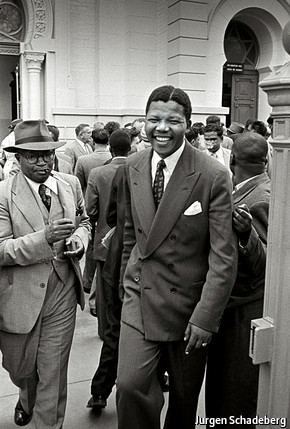
A proper young man
Some of his own children might not have agreed, or perhaps they would have said that his efforts to understand other people’s children were an acknowledgment of his failures with his own. For the contradictions and paradoxes in his views and politics were matched in his character, and nowhere was this more evident than in his relations with his family.
Trouble and strife
His first son, Thembi, had become estranged from his
father several years before his death in a car crash in 1969 (a
daughter had died at nine months in 1948). Thembi had sided with his
mother, Evelyn, when Mr Mandela divorced her in 1958 after a marriage
of 14 fairly unhappy years. His brother, Makgatho, failed to live up to
his father’s expectations and moved away; he died of AIDS in 2005.
Maki, Evelyn’s surviving daughter, remained on better terms but also
felt neglected.Matrimony proved just as difficult as fatherhood. At the age of 22 he had run away to Johannesburg to escape a marriage arranged for him by his guardian, the Thembu regent. Three years later, in 1944, he would marry Evelyn, a nurse, and the first cousin of his lifelong friend Walter Sisulu. She bore him four children, but was drawn more to religion than politics, and politics was by then his all-absorbing concern. Winnie, his second wife, whom he married in 1958, came to share his political cause, but from the first realised that “he belongs to them”, the public. This was a complaint of the children too, as Mr Mandela himself confessed. He was, one told him, “a father to all our people, but you have never had time to be a father to me.”
Despite his devotion to the courageous Winnie—in his 1994 autobiography, he would publish for the first time some of the poignant letters he had written to her from Robben Island—the second marriage also failed. Winnie suffered almost all the blows that apartheid had in its arsenal: banishment, imprisonment, remorseless harassment. But suffering did not ennoble her: just the opposite, and in the end she did her utmost to humiliate her husband. He was wounded, but also guilt-ridden, conscious of his failings with his family. Not until he married a wary Graca Machel, widow of Mozambique’s first president, on his 80th birthday did Mr Mandela find enduring wedded fulfilment.
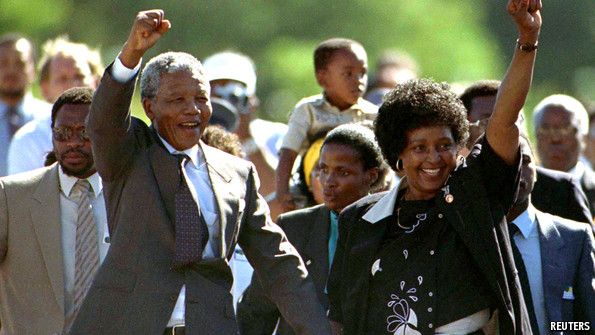
With Winnie, free at last
One of the first was P.J. Bosch, the prosecutor at his 1962 trial (for leaving the country illegally and incitement to strike), who before his sentencing asked to see him alone, shook his hand and wished him well. That was not exceptional. Throughout his career, he would be sharing his food with his police escort (after arrest in 1962), helping warders with their essays (also 1962), and earning the respect of their Robben Island counterparts by speaking to them in Afrikaans, which he studied assiduously. Later, summoned from prison to take tea with President P.W. Botha, he would show that he could charm even one whose defence of white supremacy had earned him the name of “the crocodile”. And then, when he was at last released, came the grand gestures of reconciliation: the honouring of the Boer-war guerrilla, Daniel Theron, as an Afrikaner freedom-fighter; the donning of a Springbok rugby shirt, hitherto a symbol to blacks chiefly of white nationalism; and the visit to Betsie Verwoerd, widow of Hendrik, the uncompromising architect of apartheid.
Some manifestations of empathy were harder for him to make. When he came out of jail the subject of sex was awkward for him. Whether that was because he had been behind bars for most of the 1960s sexual revolution, or because the many years of isolation had made him unused to female company, or because some element of reserve had remained in his character since childhood, is not clear. But he plainly found it difficult to overcome, most seriously, by his own admission, in his reluctance as president to take up the issue of AIDS. Eventually, he did so, however, openly siding in 2002 with the campaigners who were fighting for wider provision of drugs in the face of President Thabo Mbeki’s cranky resistance. A lesser man might have chosen to stay silent.
Modesty, humility, vanity
Mr Mandela startled ANC colleagues when, at 33, he
announced that he looked forward to becoming South Africa’s first black
president. Yet he did not expect rewards; even when he was a figure of
world renown he was modest, and seldom took his authority for granted.
Time and again in jail he would refuse privileges if they were offered
to him but not to other prisoners. He complained, for instance, about
having to wear shorts, one of the ways in which the government
humiliated and emasculated black prisoners, but rejected the long
trousers he was then given—until two years later, when the authorities
agreed to let his colleagues wear them too.He was proud, it is true, to be a member of a royal family, as a descendant of Ngubengcuka, one of the Thembu kings from whom he took the traditional name, Madiba. Yet he disdained to behave like some African “big men”, always being embarrassed on Robben Island that he received more visits than other prisoners, one of whom saw only three visitors in 15 years. As a free man in the 1990s, he chose to live in suburban comfort rather than palatial luxury in Johannesburg, and in the holidays returned to Qunu, where he had spent the happiest days of his childhood, to build a house based on the design of his quarters in the Victor Verster prison that had held him during his final years of captivity. He encouraged no cult of personality. Grandiose museums, reverential monuments and statues were alien to him.
But flash suits, white silk scarves and a physical-fitness regimen at least partly designed to maintain a boxer’s muscular physique were not. He was no stranger to vanity, and would make good use of his appearance. In his youth, his looks and smart suits had done him no harm among female admirers. He was then considered more at ease with women than with men. Later, when he donned a kaross, a traditional Xhosa leopard-skin cloak, to appear in court, he knew it would “emphasise the symbolism that I was a black African walking into a white man’s court”. This proved electrifying.
It suited the ANC to make a messiah, and if necessary a myth, out of Mr Mandela, first to galvanise the masses at home, then to keep spirits up during the long years of repression, military impotence and political hopelessness. It could have ended badly. The mythical figure whose defiance so captured the public imagination—Prisoner 46664 on Robben Island—could have turned out to be a broken man or a paper hero. Instead, he proved to be a remarkably effective politician.
Mr Mandela made political mistakes. The decision to abandon non-violence lost the ANC some support abroad, put no real military pressure on the government and, most seriously, diverted the movement’s energies from the task of organisation at home, which was essential if strikes, boycotts and civil disobedience were to be effective. Mr Mandela, who had set so much store by strengthening the ANC, a small and weak organisation when he joined it, might have foreseen that.
But without him the transition to majority rule would almost certainly have been a bloody shambles. First, he decided in 1985 to ask for a meeting with the minister of justice, Kobie Coetsee, who had become interested in his case. Mr Mandela did this without telling his colleagues, let alone seeking their approval, since he knew it would not have been given. But, as he later explained, “There are times when a leader must move ahead of his flock.” He then played a vital role in ensuring compromise during the negotiations that preceded the constitutional settlement of 1993-94 and the election that followed.
He alone could sway opinion for or against the acceptance of agreements, which was crucial in the case of the constitution, greeted by many ANC supporters with disappointment. He alone could assuage the fury of the crowds after Chris Hani, a popular ANC hero, was murdered by a right-wing Pole; he pointed out that an Afrikaner had actually helped to catch the killer. He was also central in securing the support of General Constand Viljoen and thus the Afrikaner far right. Later he was equally influential in the creation of the Truth and Reconciliation Commission, when a different man who had been through the same experiences might have been calling for war-crimes tribunals.
Mr Mandela did not single-handedly end apartheid. The collapse of communism, yoked to African nationalism by white opponents, played a part; so did international sanctions, domestic economic pressures, non-ANC internal resistance and the person of F.W. de Klerk, president from 1989 to 1994, whom Mr Mandela did not treat altogether well. But Mr Mandela’s symbolic role was hard to exaggerate.
His greater achievement was to see the need for reconciliation, to forswear retribution and then to act as midwife to a new, democratic South Africa, built on the rule of law. This was something only he could do. He gave hope to millions of Africans and inspired millions of others elsewhere, but if his successors in government have been less admirable, and if his example has not been followed in countries like Zimbabwe, that should not be surprising. Heroic though he was, he did not have the messianic powers some attributed to him, nor could others be expected to match his capacity to hold high principles, to live by them and to use his moral stature to such effect. Circumstances, after all, could hardly suit everyone so well. Hard though much of his life had been, Mr Mandela lived long enough to see his work through. That gave him his great achievement, and his story a happy ending. And the modern world loves a happy hero even more than a tragic one.
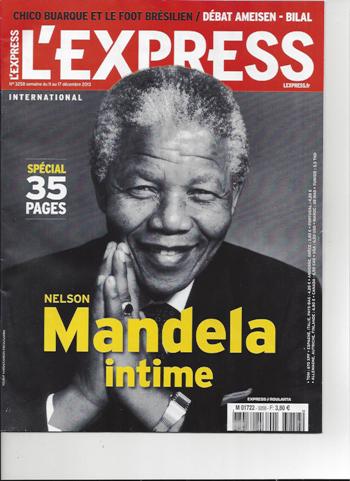
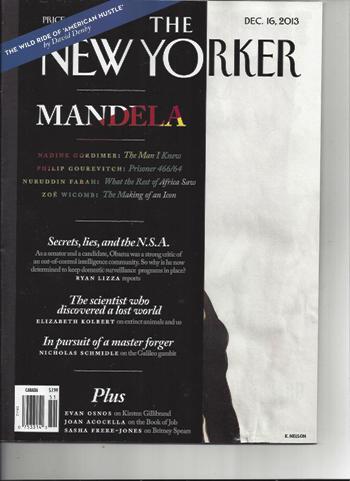
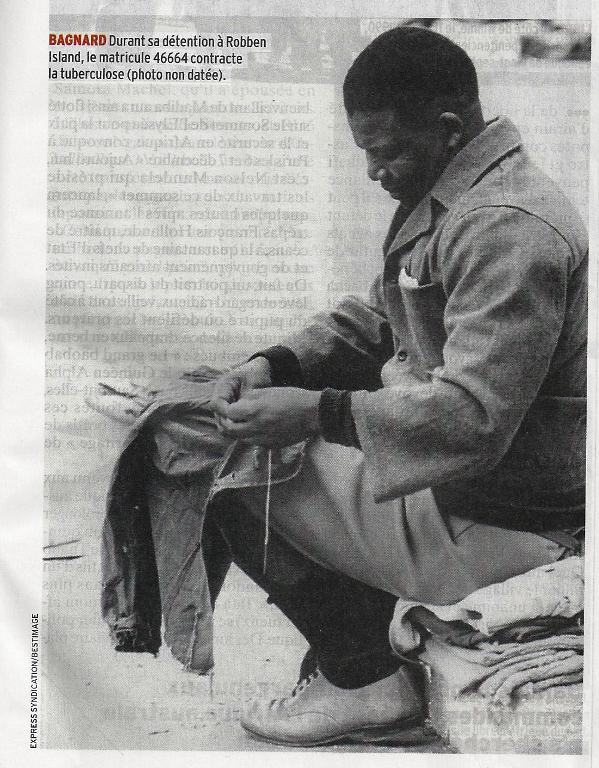

Comments
Post a Comment